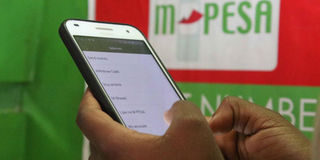Why Safaricom must now be split

A Safaricom customer withdraws money through M-Pesa in Nyeri on May 2, 2016. If you are an M-Pesa customer and you receive Airtel money, you must draw the entire amount in cash within seven days. PHOTO |JOSEPH KANYI | NATION MEDIA GROUP
What you need to know:
- Regulatory authorities have an obligation to protect consumers against abuse of market power.
- A few separate legal entities licensed to provide network facilities (distributors) and many content developers (media houses) to compete on content.
Not too long ago, M-Pesa agents and their extended small-scale sub-agents were not allowed under their existing contracts with Safaricom to deal with any other money transfer company or competitor in their premises.
I wrote about this blatant abuse of dominance by Safaricom in September, 2013.
The matter has since been resolved but it is banks, not telecom companies, that have taken advantage of this welcome development.
However, another problem persists to date.
If you are an M-Pesa customer and you receive Airtel money, you must draw the entire amount in cash within seven days, otherwise it is returned to the sender.
It cannot be credited to your “E-wallet” (my term) account.
This is the logic equivalent of Barclays Bank insisting that all cheques drawn on other banks will not be credited to your account but instead, the entire amount must be drawn by cash within seven days.
Otherwise the money is returned to whoever gave you the cheque in the first place.
That only cheques drawn on their Barclays branch network are creditable to your Barclays Bank account.
Therein lies the reason M-Pesa must be a separate money entity licensed by the Central Bank of Kenya and not the Communications Authority of Kenya.
ABUSE OF MARKET POWER
But whenever Safaricom is challenged, it deploys a squadron of high-profile protectors, whose main refrain is a hideous uniformity of thoughtless logic against critics who are said to be merely trying to “punish” Safaricom for its success.
The latest surge of this protection logic was initiated, rather gingerly, by Nation columnist Jaindi Kisero in his article published on February 21.
He seems to have had access to a consultants’ report, which has not yet been shared with industry stakeholders, or the public.
Kisero’s take was then buttressed formally by the newspaper in an editorial.
This is the highest form of support from a media house.
The Daily Nation endorsement was followed by comments by ICT Cabinet Secretary Joe Mucheru in the same vein.
In the Wednesday paper, former chief executive of Nation Media Group Linus Gitahi also weighed in.
I disagree with these sentiments but I do not argue with success.
Safaricom is a dominant player. I hasten to clarify that market power, or dominance is neither bad nor illegal.
What the law must do is merely caution against abuse of market power and we already know that Safaricom has abused its market dominance in the past and continues to do so.
In fact, chief executive Bob Collymore admitted as much on camera. “We have bullied some people,” he said recently.
Regulatory authorities, therefore, have an obligation to protect consumers against this abuse of market power.
Consumer protection is the basis, the ONLY basis, for the call to split Safaricom into three entities and the argument that this is intended to punish success is diversionary hogwash.
THE STRATEGY
The fundamental reality is that today, nearly the entire infrastructure in telecommunication sub-sector is owned by Safaricom and only a small fraction by Airtel.
This means the financial barrier to entry by new players is virtually insurmountable.
This is the basic logic for hiving off a separate infrastructure entity from Safaricom, the service provider.
We have a precedent. The huge controversy between the Communications Authority and the mainstream media during the TV digital migration was founded on the same logic.
A few separate legal entities licensed to provide network facilities (distributors) and many content developers (media houses) to compete on content.
The compelling rationale with this arrangement is that provided the licensed network facilities’ user fees are non-discriminatory, the entry barrier of huge infrastructure costs for new entrants is eliminated.
This promotes growth and fair competition.
The same rationale must be applied to Safaricom.
A new separate legal network facilities licensee, co-owned by Safaricom and Airtel in proportion to their existing infrastructure investments, is imperative.
Actually, the CA already has a Unified Licensing Framework, which structured into three main licences: Network Facilities Provider, Application Service Provider and Content Service Provider.
An entity may be issued with multiple commercial licences, provided that it maintains separate accounts for each licence.
This is how Safaricom is licensed.
The writer is a consultant in public affairs and policy. [email protected]





